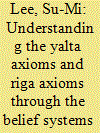| Srl | Item |
| 1 |
ID:
110436


|
|
|
|
|
| Publication |
2011.
|
| Summary/Abstract |
This article addresses the issue of wind energy acceptance in the Canadian province of Quebec and, in particular, the impact of different models of wind power development on the degree of social acceptance. We show that the dominant advocacy coalition, which favors a hard path energy development in general, enforces a large-scale development of wind energy. Two other coalitions - a soft path coalition and a nationalist coalition - oppose this development, but not wind energy per se. We argue that difference in belief systems explains their opposition rather than planning issues or NIMBY concerns. We also contend that, despite its predominance over (wind) energy policy, the hard path coalition is willing to learn and make concessions towards the soft path coalition, but not towards the nationalist coalition.
|
|
|
|
|
|
|
|
|
|
|
|
|
|
|
|
| 2 |
ID:
140281


|
|
|
|
|
| Summary/Abstract |
This research employs stakeholder analysis based on the Advocacy Coalition Framework (ACF) to examine two coalitions of US foreign policy during the postwar and early Cold War periods. It defines the proponents of the Yalta axioms and the proponents of the Riga axioms as two purposive groups based on ideological positions. By identifying the stakeholders, their strategic bases, their belief systems (with respect to the Soviet Union), and their policies and resources, this research demonstrates how each coalition formed and competed with the other. More importantly, it offers a way to understand the seemingly inconsistent policy positions of Kennan and Bohlen that supported the Riga axioms at one time and opposed them at another time. By so doing, this research demonstrates the utility of the ACF in examining foreign policies.
|
|
|
|
|
|
|
|
|
|
|
|
|
|
|
|